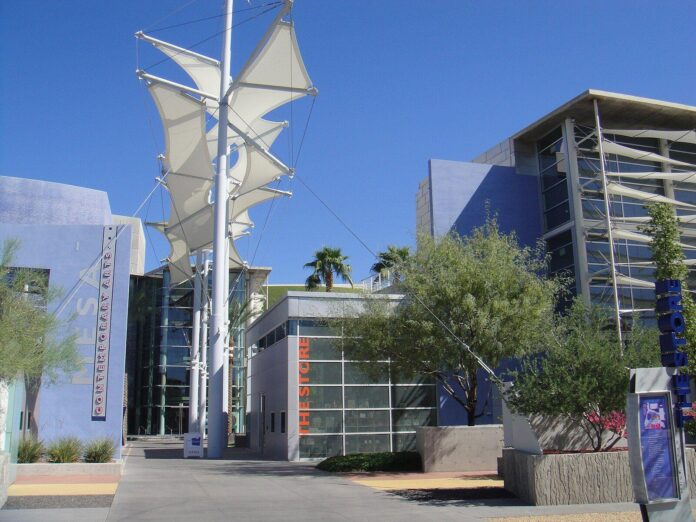The city of Mesa, Arizona, has been accused of censorship after postponing the entire autumn exhibitions lineup at the Mesa Contemporary Arts Museum, which operates under the auspices of the city-owned Mesa Art Center, over local officials’ objections to a single artwork in one of the five planned shows.
According to reporting by Southwest Contemporary and others, a piece by artist and activist Shepard Fairey—best known for his imagery for then-US Senator Barack Obama’s 2008 presidential campaign and the ensuing copyright dispute—was due to appear in the exhibition Facing the Giant: Three Decades of Dissent, which focuses on social justice and protest aesthetics in Fairey’s work. The artwork, My Florist is a Dick (2019), depicts a skeleton-faced police officer in riot gear wielding a nightstick topped with a flower. Text alongside the figure reads: “My florist is a dick. When his day starts, your days end.” The work was allegedly deemed too controversial by members of Mesa’s city council.
Representatives for the National Coalition Against Censorship (NCAC) claim the city asked museum staff to remove My Florist is a Dick from the Fairey exhibition. This request was “met with resistance” by museum workers, according to a 10 August letter that representatives of the NCAC and the American Civil Liberties Union of Arizona sent to Mesa’s city manager and deputy city manager. When the arts center staff would “not comply”, the letter continues, the city made the decision to postpone the museum’s entire lineup of autumn exhibitions—four solo shows and a group exhibition.
Rob Schultz, the Mesa Arts Center’s former assistant director, told Arizona’s Family that the work’s political tone ruffled feathers on the city council.
“Mesa runs libraries. I’ll bet the library has books that deal with police brutality, and I’ll bet the library has newspapers,” Schultz said. “When there’s an incident of police brutality in the newspapers, they don’t pull them off the shelf and not allow people to see them.”
In an official statement, representatives for the city of Mesa said, “Six weeks before the opening of the fall exhibits at Mesa Contemporary Arts Museum artists’ contracts had not yet been finalised. There were also questions about the potential impact of text in one of the works that could be disparaging toward some City of Mesa employees.” City officials insisted that postponing the shows would allow Mesa to “review its processes and evaluate the impact of the message associated with the display”.
The museum’s chief curator, Tiffany Fairall, has yet to publicly comment on the scandal.
The city’s decision to postpone the museum’s exhibitions programme comes at the expense of solo opportunities for Native artists Thomas “Breeze” Marcus (Tohono O’odham) and Douglas Miles (San Carlos Apache, Akimel O’odham), both Arizona locals whose practices encompass street and fine art.
“We have a mutual feeling this could be an attack on Native culture and identity,” Marcus told Southwest Contemporary. “It’s a massive sign of disrespect for artists, and it feels like flat-out racism.”
On 14 August, the City of Mesa shared a statement with Southwest Contemporary explaining that the Mesa Arts Center has been in contact with the affected artists and plans to move ahead with the exhibitions though “the opening will be slightly delayed”.
Elizabeth Larison, director of the arts and advocacy center program at the NCAC, told ABC15 in Arizona: “To us, this smacks strongly of censorship that certain ideas cannot be expressed or explored within this museum, and this is why we are alarmed.” She added that “there is also a placard in the museum which states the works on view do not necessarily represent the position of the city”.
Recent accusations of censorship in the US have often centred on works related to law enforcement. Hyperallergic recently reported on the removal of a banner by an Indigenous artist reading “Defund the Police, Decolonize the Streets” before the opening of an exhibition at the non-profit Chehalem Cultural Center in Portland, Oregon, an art centre housed in a building owned by the city’s Park and Recreation District.

























